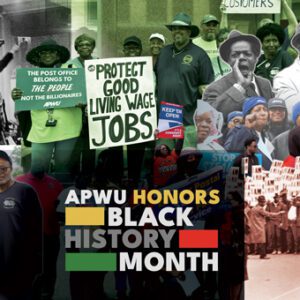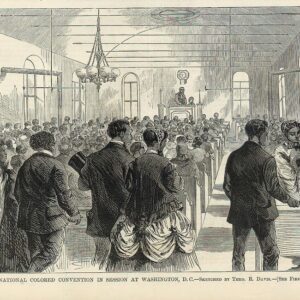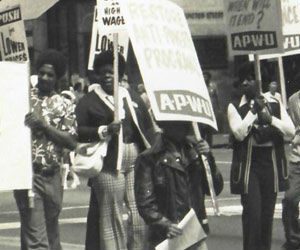October 31, 2003
Moe, Remembered
(This article was first published in the November/December 2003 issue of The American Postal Worker magazine.)
Access a printable version of this article here.
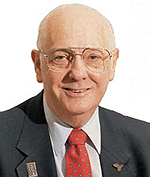 “He was a real character, a strong man with a sometimes gruff exterior. But his tough veneer masked a soft heart,” said Bill Burrus, Moe’s successor. “He never forgot where he came from, and he truly loved the working men and women of the post office, America, and the world.”
“He was a real character, a strong man with a sometimes gruff exterior. But his tough veneer masked a soft heart,” said Bill Burrus, Moe’s successor. “He never forgot where he came from, and he truly loved the working men and women of the post office, America, and the world.”After receiving word of Moe’s passing, U.S. Postmaster General John Potter ordered that flags at all postal facilities be flown at half-staff.
“He was a forceful, innovative leader,” Potter said. “Although we often disagreed, he was tireless in his efforts on behalf of American Postal Workers Union members and on behalf of the Postal Service. The American labor movement has lost a great leader today, and the Postal Service and its employees a committed champion and friend.”
The union’s third national president, Moe led the APWU for more than 20 years. “Moe was the hero of the U.S. postal workers movement,” said Burrus.“From his first job as a part-time clerk he worked seemingly around-the-clock for the labor movement. During his rise to the top he devoted himself not just to the workers he represented, but to everyone who deserved justice.”
Even trade groups such as the Association for Postal Commerce, with whom Moe often was at odds, felt compelled to pay tribute to what they called “a postal legend.”
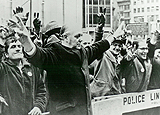
“Moe cared deeply and passionately about the welfare of the union members he served and the Postal Service for which they worked,” the bulk-mailers organization said in a statement.“ Moe was a lion of a man; but he was also a pussycat. His presence within the American postal community will be sorely missed.”
A Man of His Times
Moe Biller was born Nov. 15, 1915, in New York City. He graduated with honors from Seward Park High School and attended Brooklyn College and City College of New York. His postal career began in 1937, on the Lower East Side of Manhattan, at what is now known as Knickerbocker Station.
“I was a substitute clerk earning 65 cents an hour. There was no vacation or sick pay and I wasn’t guaranteed even a minimum number of hours,” he told the New York Times in 1980, shortly after his election to the APWU’s top post. “If I needed the bathroom, I had to leave the building.”
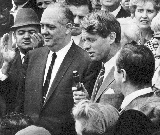
Moe had his calling — except for wartime service in the Army’s Adjutant General Corps, during which he was stationed in Europe, he continued to be employed with the Post Office and always worked not just at his job, but to improve the lot of those around him.
A unionist from the beginning, he held numerous local positions, including chairman of the Membership Committee, Sergeant-at-Arms, and Executive Vice President. He was elected president of the 25,000-member Manhattan-Bronx Postal Workers Union (now called New York Metro APWU) in 1959 and was still at the helm over a decade later, during the Great Postal Strike.
Although it was a local of the National Association of Letter Carriers that first walked off the job in New York on March 17, 1970, it was Moe’s fiery rhetoric that kept his members from crossing picket lines, and that gave the strike its force and brought it to the nation’s attention. Charles Salk was a first vice president of the clerks local at the time. “On the eve of the strike,” Salk said, “Moe ordered all officers to the union office — No one was to leave.
“Just before midnight, I received a phone call from our Tour 1 shop steward. He said there was a picket line of letter carriers in front of the employees’ entrance of the Grand Central Station post office, carrying signs saying ‘On Strike’ and urging the employees not to go inside. Hundreds of our workers were waiting for instructions. I passed the message to Moe and without hesitating he said, ‘tell the steward to tell the workers that we don’t cross picket lines.’ As a result, nobody on Tour 1 went to work and word spread like wildfire to the GPO and all over the country: Postal workers were on strike.”
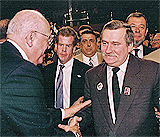
The first strike in the history of the nation’s postal service spread to 30 major cities, with more than 200,000 postal employees taking part. In an effort to end the job action, President Richard Nixon declared a national emergency and ordered federal troops to New York in a futile attempt to sort and deliver the mail.
By the time it was over, Nixon had offered the workers amnesty and they had been assured of a huge pay raise. Soon thereafter, Congress passed the Postal Reorganization Act of 1970, which created the United States Postal Service.
“It’s fair to say that Moe was a pioneer who created the modern labor movement for federal and postal employees,” said Sen. Joseph Lieberman (D-CT). “Surely he paved the way for the establishment of federal employees’ rights — postal workers in particular had little clout until Moe came along.”
Livelihood on the Line
Moe was never afraid to put his livelihood on the line. In the early 1950s, during the anti-communist witch hunt known as “McCarthyism,” Moe was the subject of a thick file built by the FBI. He was among those ordered to testify before the House Un-American Activities Committee, and he and seven others were fired. “I was out of work about six months,” Moe said. “Fortunately, the Supreme Court forced our reinstatement.”
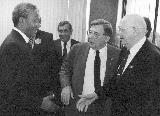
He risked being fired (and arrested) many times, and a few years after the Great Strike showed his mettle as a staunch supporter of postal workers when they struck the New Jersey Bulk and Foreign Mail Center for four days in 1974, and again, briefly, in 1978 when management sought to cap the cost-of-living-allowance.
The demonstrations and job actions put Moe front and center in a national way once again. He was elected the union’s national president in 1980, and re-elected six successive times.
While in Washington, in 1985, Moe was suspended again from his job at the Postal Service, that time for allegedly engaging in unlawful partisan political activity, a violation of the Hatch Act. Two years earlier he had surveyed the APWU membership and announced that the union was endorsing Walter Mondale’s bid for the presidency. Feisty as always, Moe dismissed the efforts of the Office of Special Counsel to discipline him “as just something to intimidate government union leadership and to scare our members.”
“Moe made the people aware of the role of the national union,” said Executive Vice President Cliff Guffey, “and he made them aware of their role in the union. He brought strong labor principles to the APWU.”
“There’s a tendency to remember mainly the personal side of Moe, how forceful he was,” said Bob Tunstall, the APWU’s secretary-treasurer. “But he made the union a more professional organization — he put the APWU on the map.”
“One of the first things he did as president,” Tunstall said, “was to call in all his markers to save the union health plan.”
“Moe was always willing to fight the good fight,” said Greg Bell, the APWU’s director of Industrial Relations.
Throughout his tenure he fought to preserve the contractual clause providing twice-annual cost-of-living adjustments (COLA) and, in 1984, helped negotiate penalty overtime, something of which he was especially proud. “He often said he wanted ‘penalty overtime’ written on his tombstone,” Burrus said. Moe is also widely remembered for his role in helping to create the Federal Employees Retirement System (FERS) in the early 1980s.
During the later years of Moe’s presidency, he fervently supported APWU campaigns to organize private-sector postal workers. “I feel that if we have labor agreements in the private sector,” Moe said, “there will be less of an incentive for the Postal Service to contract out our work.” Upon his retirement in 2001, he said that he hoped that expanded organizing among businesses that do work with the Postal Service would be his legacy.
Rights for All
Yet it was never just about workers. AFL-CIO President John Sweeney, speaking at Moe’s funeral, said, “He was one of the first labor leaders in America to embrace the cause of Civil Rights for minorities, and one of the very first to champion full rights for women — and he did both at a time when such actions were considered risky, if not radical.”
“My father fought against segregation of the postal unions in the 1940s,” said his son, Steven Biller. “Civil Rights was an issue near and dear to him — Dad was at home when we heard that Martin Luther King had been shot. He put on his hat and coat and when my mother asked him where he was going, he said, ‘I’m going to Harlem to be with my members.’” Years later, Moe was a vocal leader in the fight to gain recognition of King’s birthday as a national holiday.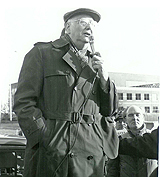
“Moe was a champion for human rights — Civil Rights, workers’ rights and women’s rights,” said Josie McMillian, who succeeded him as president of APWU New York Metro.“His compassion for others was immeasurable. When no one else would, Moe Biller challenged his male counterparts to recognize and support the value of the female members of the APWU. He was the first president to appoint a woman to a national position and to assign a woman to chair a national convention.
“It was under Moe’s leadership, and with his support, that I became the first woman and first Black to be president of the union’s largest local,” McMillian said. “Post Office Women for Equal Rights (POWER) and the Coalition of Labor Union Women (CLUW) were always a Number One concern for Moe Biller.”
And, responding to the announcement of Moe’s pending retirement three years ago, Sen. Tom Harkin (D-IA), remembered that although several dozen labor organizations are headquartered in Washington, “Moe was the only union president to go on campus and speak on behalf of students at Gallaudet University during their drive for the appointment of a deaf person to head their school.”
“Moe’s contributions to the cause of justice and the labor movement were enormous,” said Burrus. “He prized democracy within our union and in society, always fighting to ensure that workers’ voices were heard at the negotiating table and in the halls of Congress.”
A Public Figure
Moe served on the boards of numerous charitable and civic organizations and received countless honors for his good works, including the 1979 Community Service Award from the New York Central Labor Council and, in 1982, the Spirit of Life Award from the City of Hope National Medical Center.
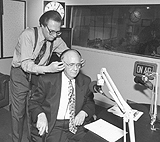
In 1999, Moe received the Ellis Island Medal of Honor and the Lower East Side Tenement Museum Urban Pioneer Award. He was especially proud of his association with the museum, which is near where it all began.
“Moe Biller was an anchor of stability and a pillar of strength for workers who depended on his voice to articulate their problems, their needs, their hopes and dreams,” said William L. Clay Sr., the Missouri Democrat who for many years chaired the House Post Office and Civil Service Committee.
“We can all take comfort in knowing that through his dedication to the principle of justice for workers, our country is better off,” Clay said. “He left the labor movement far stronger, smarter and more productive than it was when he joined it.”
For Moe, his signature phrase, “the struggle continues,” meant that justice never comes easy, that there’s much to be done, and that the union movement he always embraced is the only way to ensure progress for working people and their families.
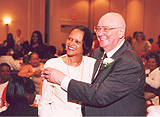
Moe’s wife of 38 years, Anne Feifer Biller, died in 1978. Survivors include his two sons, Steven, of Woodmere, NY, and Michael, of New York City; a brother, Edward, of Great Neck, NY, and a sister, Mae Blecher, of Las Vegas; two granddaughters, and hundreds of thousands of postal workers, past and present, who have lived better lives because they were touched by Moe.
Reflections
“Moe Biller taught us how to bargain hard, strike tough, and never, never cross a picket line. But for all that and his sharp accent and his famous attitude, he was a real softie when it came to helping anyone who was down on his or her luck, and he was the champion of every underdog he ever encountered.” – John Sweeney AFL-CIO President
“When Moe made his first trip to the Northwest in the 1980s, he was surprised to find how informal things were – I’m sure he had a tux packed in his suitcase, but he dressed down with ease. I drove him around in my VW beetle and after the installation of officers, the new local president broke out a guitar. Moe didn’t miss a beat: He could sing the working people’s songs and lead a union.” – Bob Nelson former VP, Seattle Local
“I first met Moe at the 1974 convention when he made ‘No Contract, No Work’ our national theme. In Alabama, we probably thought he was quite a radical. I had been president of the state APWU for two years, and all the local presidents dared me to invite Moe to speak at our winter conference. I went to his table and introduced myself and found – not a radical – but simply a dedicated union leader who wanted nothing but the very best for all its members. He came to Alabama and returned many times.” – Harold E. Terry, President Alabama Postal Workers Union
“Moe was always there on all the great issues of our time, especially when it concerned progressive labor legislation, civil rights, and affordable healthcare for all Americans.” – Sen. Ted Kennedy (D-MA)
“Moe Biller’s voice may be silent, but the principles for which he lived and fought for can be heard all around the world. It is often said that success in life can be measured by how many people one is able to touch in a positive way. By all accounts, Moe Biller lived a pretty successful life. Even those who did not agree with him respected him for his courage and passion.” – Rep. Danny Davis (D-IL)
“In a skit with the APWU Solidarity Kids Theater in 1995, Moe told the children about his first labor struggle. ‘I lost my job sewing buttons and buttonholes on the flies of boys’ pants,’ he said, ‘because of a great advancement in technology – Someone had gone out and invented the zipper!’ Moe always had a good story that would connect us to the struggle.” – Greg Poferl National Business Agent
“Moe Biller was a staunch advocate for the men and women he represented [and] a strong ally to NALC in many of its battles.” – William H. Young, President National Association of Letter Carriers
“Whenever I introduced him as a ‘giant among American labor leaders and a legend in his own time,’ he would tell me that he was honored, but didn’t consider himself a legend. Deep down though, I think he appreciated the esteem bestowed upon him by so many. “It was an especially great experience to go to dinner with Moe. It was not unusual to end up sitting next to Larry King or a member of Congress – everyone would pay their respects. In return, Moe never failed to introduce his guests, which always made them feel special and important.” – John H. Dirzius, President Greater Connecticut Area Local
“When Moe helped establish the Deaf/Hard of Hearing Task Force in 1988, it meant the APWU was the first union to be involved on a large scale with its deaf and hard of hearing membership.” – Hugh Fung, Representative D/HH Task Force
“Over the years I was honored to work with Moe. He was totally committed to improving the quality of life of postal workers and their families. He followed that goal with enviable passion, great commitment and tireless energy.” – Vincent E. Sombrotto, President Emeritus National Association of Letter Carriers
“I have a vivid memory of Moe that carried through each of the few times that I met him. Moe was a man who commanded dignity and respect, which he earned through his diligent representation of the common man.” – Mark V. Case, President Asheville Area Local
“The contributions made by Moe Biller were for the betterment of all postal employees, including all mail handlers employed by the U.S. Postal Service.” – National Postal Mail Handlers Union
“As a relatively new steward at my first convention many years ago, I was honored to meet Moe and shake his hand, but of course I got a kiss instead. To my amazement, the next time I saw him, over a year later, he called me by my name and gave me a kiss like we were old friends. Moe was one of a kind.” – Linda Castillo, President Houston Local
“My father can be described in many ways – ‘Mr. Metro,’ ‘Mr. Post Office,’ ‘Mr. APWU,’ and ‘President Emeritus.’ To me, though, he was, and always will be, ‘daddy’ or ‘dad.’ – Michael Biller

